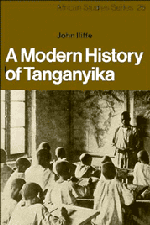Book contents
- Frontmatter
- Contents
- List of maps and tables
- Preface
- Acknowledgments
- Terminology
- Abbreviations
- Map I Tanganyika
- 1 Intentions
- 2 Tanganyika in 1800
- 3 The nineteenth century
- 4 The German conquest
- 5 Colonial economy and ecological crisis, 1890–1914
- 6 The Maji Maji rebellion, 1905–7
- 7 Religious and cultural change before 1914
- 8 Fortunes of war
- 9 The origins of rural capitalism
- 10 The creation of tribes
- 11 The crisis of colonial society, 1929–45
- 12 Townsmen and workers
- 13 The African Association, 1929–48
- 14 The new colonialism
- 15 The new politics, 1945–55
- 16 The nationalist victory, 1955–61
- Bibliography
- Index
5 - Colonial economy and ecological crisis, 1890–1914
Published online by Cambridge University Press: 03 May 2011
- Frontmatter
- Contents
- List of maps and tables
- Preface
- Acknowledgments
- Terminology
- Abbreviations
- Map I Tanganyika
- 1 Intentions
- 2 Tanganyika in 1800
- 3 The nineteenth century
- 4 The German conquest
- 5 Colonial economy and ecological crisis, 1890–1914
- 6 The Maji Maji rebellion, 1905–7
- 7 Religious and cultural change before 1914
- 8 Fortunes of war
- 9 The origins of rural capitalism
- 10 The creation of tribes
- 11 The crisis of colonial society, 1929–45
- 12 Townsmen and workers
- 13 The African Association, 1929–48
- 14 The new colonialism
- 15 The new politics, 1945–55
- 16 The nationalist victory, 1955–61
- Bibliography
- Index
Summary
Two processes dominated Tanganyika's economic history under German rule. One was the re-ordering of economies into a colonial pattern, just as they had previously been re-ordered around trade with Zanzibar. The colonial economy took over certain nineteenth-century structures – notably the lines of communication – but was otherwise sharply discontinuous with pre-colonial economic patterns. Nineteenth-century structures were not easily broken, however. It was not until railway-building accelerated in the early 1900s that a recognisably colonial economy emerged.
Alongside this process went a more dramatic experience. European invasion accelerated Tanganyika's incorporation into the world's disease environment as well as its economy. The last decade of the nineteenth century was a time of appalling natural disaster. To European occupation and intensified warfare were added human and animal diseases, locust invasions, drought, and famine, on a scale unparalleled in traditions of earlier periods. Immediate suffering and probable demographic decline were followed by an expansion of the natural ecosystem of bush, game, and parasites at the expense of men, livestock, and cultivation.
The central problem of Tanganyika's economic history in this period is to identify the relationship between the impact of capitalism and ecological change. Hypotheses must be tentative, for research has only recently begun and the available evidence is inadequate. There are no reliable population figures, for example, while the German government's statistics, although copious and superficially exact, are probably trustworthy only where they concern foreign trade. Nevertheless, the colonial government's records in Tanzanian and German archives provide a wealth of information not available for earlier periods.
- Type
- Chapter
- Information
- A Modern History of Tanganyika , pp. 123 - 167Publisher: Cambridge University PressPrint publication year: 1979



